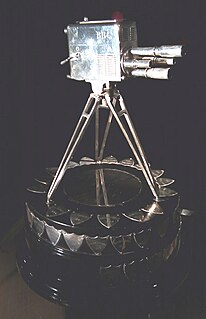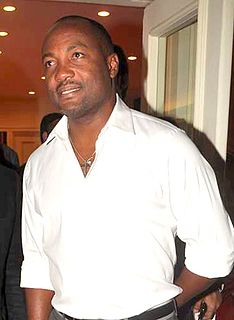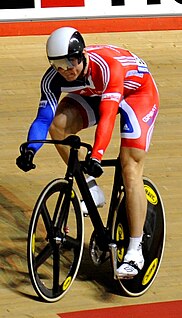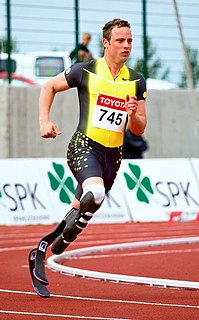
The BBC World Sport Star of the Year (formerly known as the BBC Overseas Sports Personality of the Year [1] [2] ) is an award presented at the annual BBC Sports Personality of the Year award ceremony. The award is presented to a non-British sportsperson considered to have made the most substantial contribution to a sport in that year. The award was decided by a panel of over 30 sporting journalists. Each panellist voted for their top two choices; their first preference was awarded two points, and their second preference was awarded one point. The winning sportsperson had the most total points. In the case of a points tie, the sportsperson chosen as first preference by the most panellists is the winner. If this is also a tie the award is shared. [3] In 2015 the public voted for this award.

The BBC Sports Personality of the Year is an awards ceremony that takes place annually in December. Devised by Paul Fox in 1954, it originally consisted of just one, the BBC Sports Personality of the Year Award. Several new awards have been introduced, and currently eight awards are presented. The first awards to be added were the Team of the Year and Overseas Personality awards, which were introduced in 1960. A Lifetime Achievement Award was first given in 1995 and again in 1996, and has been presented annually since 2001. In 1999, three more awards were introduced: the Helen Rollason Award, the Coach Award, and the Newcomer Award, which was renamed to Young Sports Personality of the Year in 2001. The newest is the Unsung Hero Award, first presented in 2003. In 2003, the 50th anniversary of the show was marked by a five-part series on BBC One called Simply The Best – Sports Personality. It was presented by Gary Lineker and formed part of a public vote to determine a special Golden Sports Personality of the Year. That year Steve Rider and Martyn Smith wrote a book reflecting on the 50-year history of the award and the programme. The event was held outside London for the first time in 2006, when tickets were made available to the public.
Contents
The Overseas Personality award was first presented in 1960, six years after the BBC Sports Personality of the Year award was introduced. The first recipient of the award was Australian middle distance runner Herb Elliott. [4] Since then, the award has been presented to 49 sportspersons. Swiss tennis player Roger Federer has won the award four times. American boxer Muhammad Ali and Jamaican sprinter Usain Bolt have both won the award three times. [5] The award has been shared on three occasions—by Ron Clarke and Gary Player in 1965, Eusébio and Garfield Sobers in 1966, and Evander Holyfield and Michael Johnson in 1996. [6] The husband-and-wife skating duo of Oleg Protopopov and Ludmila Belousova are the only pair to have won the award, doing so in 1968. [7] Belousova was the first woman to become Overseas Personality—she was also the oldest, aged 33. George Moore is the oldest recipient of the award, winning in 1967 aged 44. The youngest recipient of the award is Nadia Comăneci, who won in 1976 at age 15. Boris Becker, who was 18 when he won in 1985, is the youngest male to have won. [6]

Herbert James ElliottAC MBE is a former Australian athlete and arguably the world's greatest middle distance runner of his era. In August 1958 he set the world record in the mile run, clocking 3:54.5, 2.7 seconds under the record held by Derek Ibbotson; later in the month he set the 1500 metres world record, running 3.36.0, 2.1 seconds under the record held by Stanislav Jungwirth. In the 1500 metres at the 1960 Rome Olympics, he won the gold medal and bettered his own world record with a time of 3:35.6.

Roger Federer is a Swiss professional tennis player who is currently ranked world No. 4 in men's singles tennis by the Association of Tennis Professionals (ATP). He has won 20 Grand Slam singles titles—the most in history for a male player—and has held the world No. 1 spot in the ATP rankings for a record total of 310 weeks, including a record 237 consecutive weeks. After turning professional in 1998, he was continuously ranked in the top ten from October 2002 to November 2016. He re-entered the top ten following his victory at the 2017 Australian Open.

Muhammad Ali was an American professional boxer, activist, and philanthropist. He is nicknamed "The Greatest" and is widely regarded as one of the most significant and celebrated sports figures of the 20th century and as one of the greatest boxers of all time.
Twenty different countries have been represented by the award winners. United States sportspersons have won the award the most times, having had nineteen recipients, two of whom shared the award. Three cricketers have received the award -- Garfield Sobers of Barbados, Brian Lara of Trinidad and Tobago (both of whom played for the West Indies cricket team), and Shane Warne of Australia. [8] [9] Thirteen sporting disciplines have been represented; tennis has the highest representation, with fifteen recipients. The most recent recipient in 2017 was Swiss tennis player Roger Federer. [10]

Sir Garfield St Aubrun Sobers, AO, OCC, also known as Gary or Garry Sobers, is a former cricketer who played for the West Indies between 1954 and 1974, and is widely considered to be cricket's greatest all-rounder.

Brian Charles Lara, is a Trinidadian former international cricketer, widely acknowledged as one of the greatest batsmen of all time. He topped the Test batting rankings on several occasions and holds several cricketing records, including the record for the highest individual score in first-class cricket, with 501 not out for Warwickshire against Durham at Edgbaston in 1994, which is the only quintuple hundred in first-class cricket history. Lara also holds the record for the highest individual score in a Test innings after scoring 400 not out against England at Antigua in 2004. Lara also shares the test record of scoring the highest number of runs in a single over in a Test match, when he scored 28 runs off an over by Robin Peterson of South Africa in 2003.

The West Indies cricket team, traditionally known as the Windies, is a multi-national cricket team representing the Anglophone Caribbean region and administered by Cricket West Indies. The players on this composite team are selected from a chain of fifteen Caribbean territories, which are parts of several different countries and dependencies. As of 24 June 2018, the West Indian cricket team is ranked ninth in the world in Tests, ninth in ODIs and seventh in T20Is in the official ICC rankings.
Only one winner has ever been stripped of the award – US cyclist Lance Armstrong, whose 2003 award was rescinded by the BBC following the UCI's 2012 decision to strip Armstrong of his titles and ban him for life from the sport. [11]

Lance Edward Armstrong is an American former professional road racing cyclist, infamous for the biggest doping scandal in cycling history.
In 2018, the award was renamed BBC World Sport Star of the Year. Along with the change of name, votes could be cast from outside of the UK for the first time. [2]













